GoDaddy vs HostGator: Final verdict
GoDaddy and HostGator both offer comprehensive website building and hosting solutions, but they cater to different user needs and preferences.
-
GoDaddy (Overall Grade: 7.5/10)
stands out for its extensive range of services, including domain registration, web hosting, and a user-friendly website builder. It offers a wide variety of templates and advanced customization options, making it a versatile choice for various types of websites. GoDaddy’s strong ecommerce features, comprehensive learning resources, and robust customer support make it a reliable option for users looking for an all-in-one platform. -
HostGator (Overall Grade: 6.2/10)
, while slightly behind in overall score, excels in providing a user-friendly drag-and-drop editor and a substantial variety of customizable templates. It is particularly suitable for users with no technical background who want to create professional-looking websites easily. HostGator’s strong hosting quality and security features make it a solid choice for users prioritizing these aspects.

|

|
|
|---|---|---|
|
Design functionalities & templates |
8.0 |
7.9 |
|
Ease of use |
8.2 |
8.0 |
|
Ecommerce |
7.2 |
6.3 |
|
Website Editors |
6.7 |
7.3 |
|
Product testing options |
8.1 |
2.6 |
|
Price |
7.9 |
6.2 |
|
Hosting quality |
7.8 |
8.0 |
|
Website speed optimization |
7.6 |
6.2 |
|
Plugins and integrations |
7.3 |
7.3 |
|
Marketing features |
7.3 |
6.9 |
|
Customer support |
8.5 |
7.3 |
|
Security |
6.8 |
7.4 |
|
AI capabilities |
7.5 |
2.6 |
|
User Management |
7.3 |
3.2 |
Which one is the best for ecommerce: GoDaddy or HostGator?
 7.2
7.2
 6.3
6.3
Verdict
: GoDaddy is more suitable for comprehensive ecommerce needs, while HostGator is better for simpler, smaller-scale online stores.
-
GoDaddy
: With a score of 7.2, GoDaddy offers a robust set of ecommerce features, including versatile payment processing, shipping options, and detailed reports. It is ideal for businesses looking for a comprehensive solution with flexibility in customization and payment processing. However, when comparing GoDaddy vs HostGator, GoDaddy may require some coding knowledge for advanced customization. -
HostGator
: Scoring 6.3, HostGator provides a user-friendly website builder with essential ecommerce features like secure online payments and product search & filtering. It is suitable for smaller businesses or those with simpler ecommerce needs. However, it may lack the advanced features and flexibility offered by GoDaddy.
Which one is the best for informational and business websites?
 7.9
7.9
 7.4
7.4
Verdict
: When it comes to creating and managing informational business websites, GoDaddy slightly outperforms HostGator. GoDaddy’s comprehensive platform and user-friendly interface make it a strong choice for beginners and small businesses looking to establish an online presence.
-
GoDaddy
: GoDaddy offers a robust platform for informational business websites, scoring 7.9. It provides a wide range of templates and advanced customization options, making it easy to create a professional-looking site. The platform’s drag-and-drop interface and extensive learning resources further enhance its usability, making it a popular choice for those new to website building. -
HostGator
: HostGator, with a score of 7.4, also offers a solid option for informational business websites. Its website builder features a user-friendly drag-and-drop editor and a variety of customizable templates. However, it falls slightly short compared to GoDaddy in terms of design functionalities and ease of use. Nonetheless, HostGator’s hosting quality and security features make it a reliable choice for maintaining an online presence.
GoDaddy vs HostGator: Detailed comparison
Design functionalities & templates
Design FunctionalitiesRepresents how well each platform allows for creative design and customization of websites.Score Components:
- Template Variety (30%): Range and quality of design templates.
- Customization (30%): Flexibility and options for design alterations.
- User Interface (20%): Ease and intuitiveness of the design process.
- Responsiveness (10%): Adaptability to different devices and screen sizes.
- Innovation (10%): Unique design features and tools.
 8.0
8.0
 7.9
7.9
🏆
Winner: GoDaddy.
GoDaddy slightly edges out HostGator in terms of design functionalities and templates, offering a wider variety of templates and more advanced customization options.
GoDaddy provides an extensive collection of over 1500 website templates catering to diverse industries and design preferences. These templates cover business, ecommerce, creative, personal, and non-profit sectors, offering various styles such as modern, classic, bold, minimalist, and content-focused.
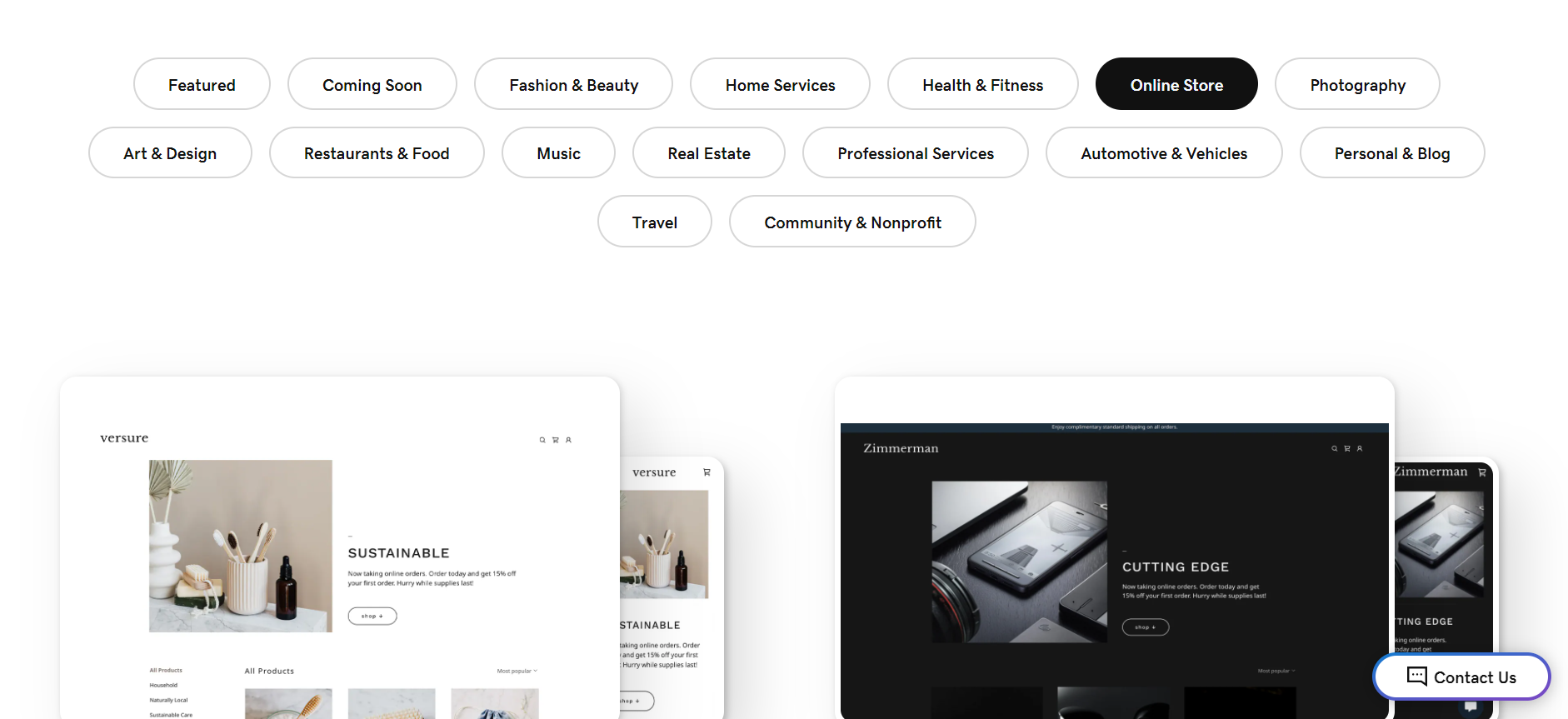

On the other hand, HostGator website builder provides a substantial variety of design templates, catering to different user needs and preferences. It offers over 200 different mobile-friendly themes. Additionally, there’s a separate collection of 4,500 templates available for free download to users hosting their sites on HostGator servers, which are not interchangeable with the site builder’s own templates.
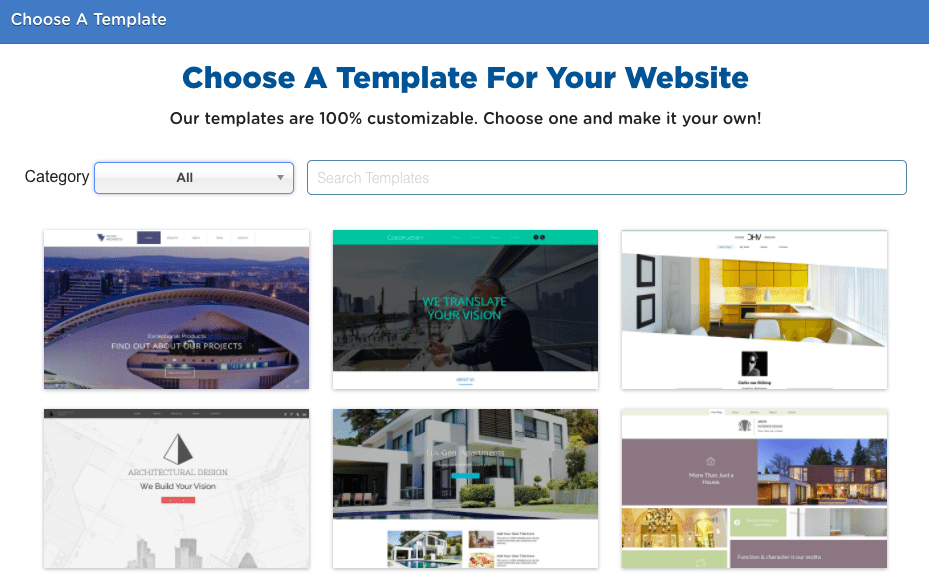
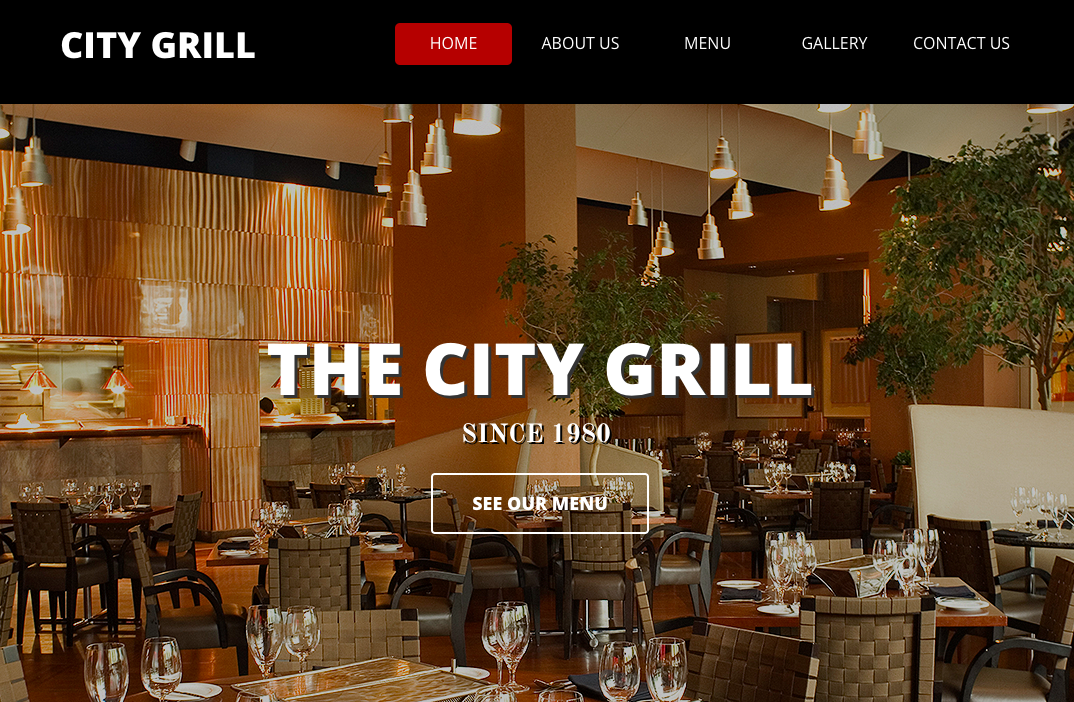
Get a head start on website creation with AI
Create a custom website tailored to your business needs 10X faster with 10Web AI Website Builder!
Ease of use
Ease of useReflects the platform’s overall user-friendliness.Score
Components:
- Learning curve (40%): Quickness and ease of getting started.
- Interface design (30%): Simplicity and intuitiveness of layout.
- User guidance (20%): Quality of tutorials and support.
- Flexibility (10%): Adaptability to various user skills.
 8.2
8.2
 8.0
8.0
🏆 Winner: GoDaddy
. Scoring a slightly higher 8.2, GoDaddy’s user-friendly platform is popular among beginners due to features like a drag-and-drop interface, WYSIWYG editor, and mobile-responsive templates. HostGator, with a score of 8.0, also offers a user-friendly platform but GoDaddy edges it out in this category.
Learning Resources
🏆 Winner: GoDaddy
. Both platforms offer solid learning resources, but GoDaddy provides a more comprehensive set for its website builder, including online documentation, video tutorials, community forums, and live sessions. HostGator also offers a range of learning resources and features, but GoDaddy’s resources are more detailed and varied.
For ecommerce
EcommerceMeasures the platform’s effectiveness in supporting online business activities.Score Components:
- Ecommerce themes and templates (20%): Variety and design of templates.
- Product management (25%): Ease of managing and organizing products.
- Payment options (25%): Variety and convenience of payment methods.
- Ecommerce features (20%): Features for managing an ecommerce store.
- Integration (10%): Compatibility with external e-commerce tools and services.
 7.2
7.2
 6.3
6.3
GoDaddy and HostGator both offer ecommerce capabilities, but they cater to different needs and scales of online businesses.

|

|
|
|---|---|---|
|
Ecommerce themes and templates |
6.5 |
7.0 |
|
Product page customization |
6.0 |
6.5 |
|
Payment processing and commissions |
7.5 |
6.0 |
|
POS capabilities |
6.0 |
5.0 |
|
Payment gateways |
7.0 |
5.5 |
|
Product numbers |
7.0 |
4.5 |
|
Additional ecommerce features |
6.5 |
6.5 |
GoDaddy ecommerce features:
- Payment processing
- Shipping options
- SEO tools
- Email marketing features
- Social media integrations
- Detailed reports
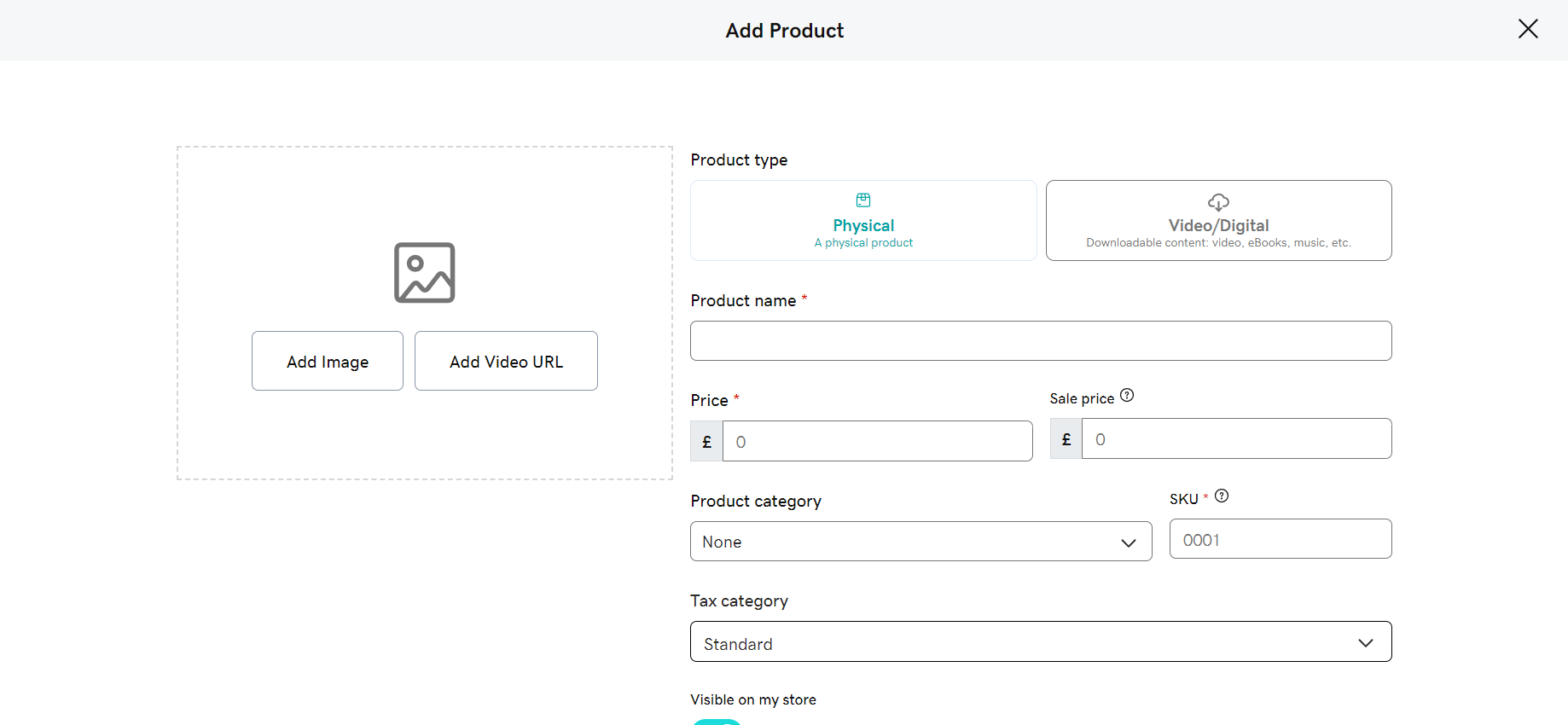
HostGator ecommerce features:
- Secure Online Payments
- Unlimited Products (only on higher Express Store plan)
- Product Search & Filtering
- Wishlists & Gift Cards
- Multi-Channel Inventory Management
- Shipping Labels
Ecommerce themes & templates
GoDaddy’s ecommerce themes, numbering around 70-80, cover diverse industries and styles, with categories including fashion, electronics, food, and more. While generally mobile-friendly with basic customization options, these themes may lack the niche variety and cutting-edge designs found on dedicated ecommerce platforms, and extensive design changes might necessitate coding knowledge within the builder’s framework.
On the other hand, HostGator’s website builder caters to eCommerce needs by offering a broad selection of free templates, all designed with mobile responsiveness in mind. These templates are equipped with essential eCommerce features such as product catalogs and payment processing options. The platform is user-friendly, enabling users to effortlessly create professional-looking online stores tailored to their specific requirements, all without the need for any coding knowledge.
Product page customization
When it comes to product page customization, GoDaddy offers users basic customization options like editing content, adding images, and adjusting layouts. For advanced customization, coding knowledge is required, enabling features such as custom CSS, third-party app integrations, and the creation of unique product page templates. Additional features include managing product variations, organizing information with tabs, and implementing discount codes and promotions directly on the page.
HostGator Website Builder offers basic features for customizing product pages, enabling users to add products with details such as name, price, description, and images. It supports product variants and categorization to enhance customer navigation. Advanced settings include inventory management, discount options, and the ability to set products as shippable or downloadable.
Payment processing
In terms of payment processing, GoDaddy Payments provides a versatile solution for online, in-person, and phone payments with a tiered pricing structure. Generally, online transactions have the lowest fees (2.3% + 30¢), while in-person and manually entered transactions have slightly higher rates (2.3% + 0¢). While featuring a transparent pricing model, user-friendly Smart Terminal for in-person transactions, and a virtual terminal for remote payments, it may lack advanced Point of Sale (POS) features. Acting as its own payment gateway, GoDaddy Payments offers simplicity, but users requiring specific integrations with shopping carts or CRM systems may find limited support.
HostGator Website Builder integrates with PayPal as a payment gateway for processing transactions. This is particularly highlighted in their offerings, suggesting that PayPal is a primary option for e-commerce activities within the platform. The platform charges a 3% transaction fee on Express Store and Express Site plans, no transaction fees are charged on higher Express Store plan.
In conclusion, GoDaddy seems to offer a more comprehensive ecommerce solution with a wider range of features and more flexibility in customization and payment processing. However, HostGator could be a suitable choice for smaller businesses or those with simpler ecommerce needs.
Website Editors
Website EditorsEvaluates the platforms’ website building and editing capabilities.Score Components:
- Customization tools (40%): Range and power of editing features.
- Editor usability (30%): User experience within the editor.
- Design flexibility (20%): Freedom in layout and design changes.
- Update and maintenance ease (10%): Simplicity of updating and maintaining the site.
 6.7
6.7
 7.3
7.3
🏆
Winner: HostGator
. With a score of 7.3, HostGator’s website builder offers a user-friendly drag-and-drop editor, enabling users to easily create and customize their websites without needing any coding knowledge. It provides a wide range of templates that are fully customizable, allowing for the personalization of layouts, colors, and fonts to match the user’s brand identity. Additionally, the editor supports the integration of various multimedia elements like images, videos, and social media links, enhancing the visual appeal and functionality of the website.
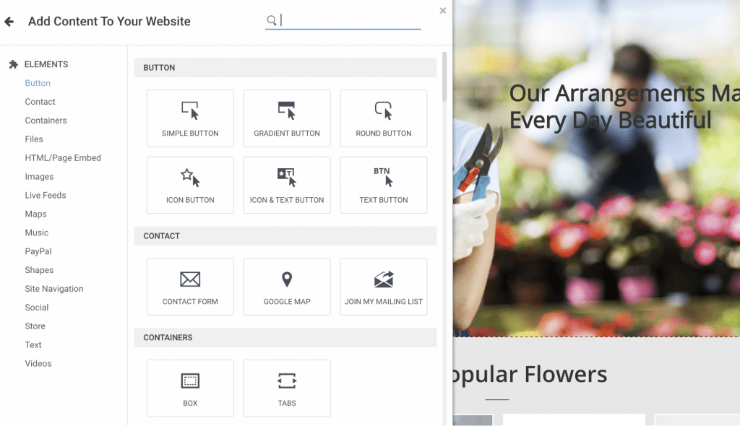
GoDaddy’s Editor, scoring 6.7, is a user-friendly drag-and-drop tool enabling website creation without coding. It offers pre-designed templates, a mobile-friendly interface, basic SEO tools, and ecommerce integration, making it accessible for beginners, with affordable pricing plans and an all-in-one solution. However, it has some design limitations, basic features compared to dedicated platforms, a learning curve for extensive use, and potentially limited third-party app integrations.
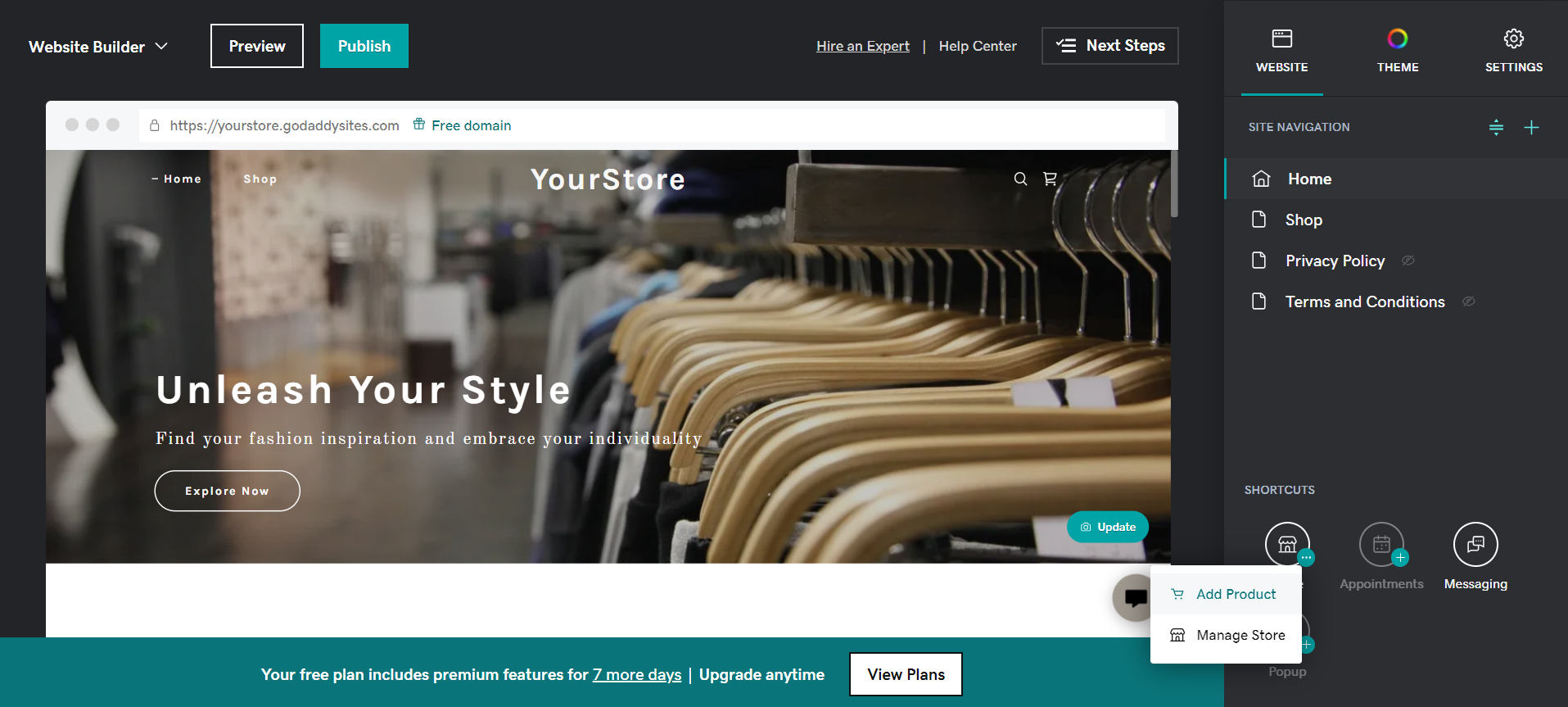
Mobile editor/app
 5.5
5.5
 4.0
4.0
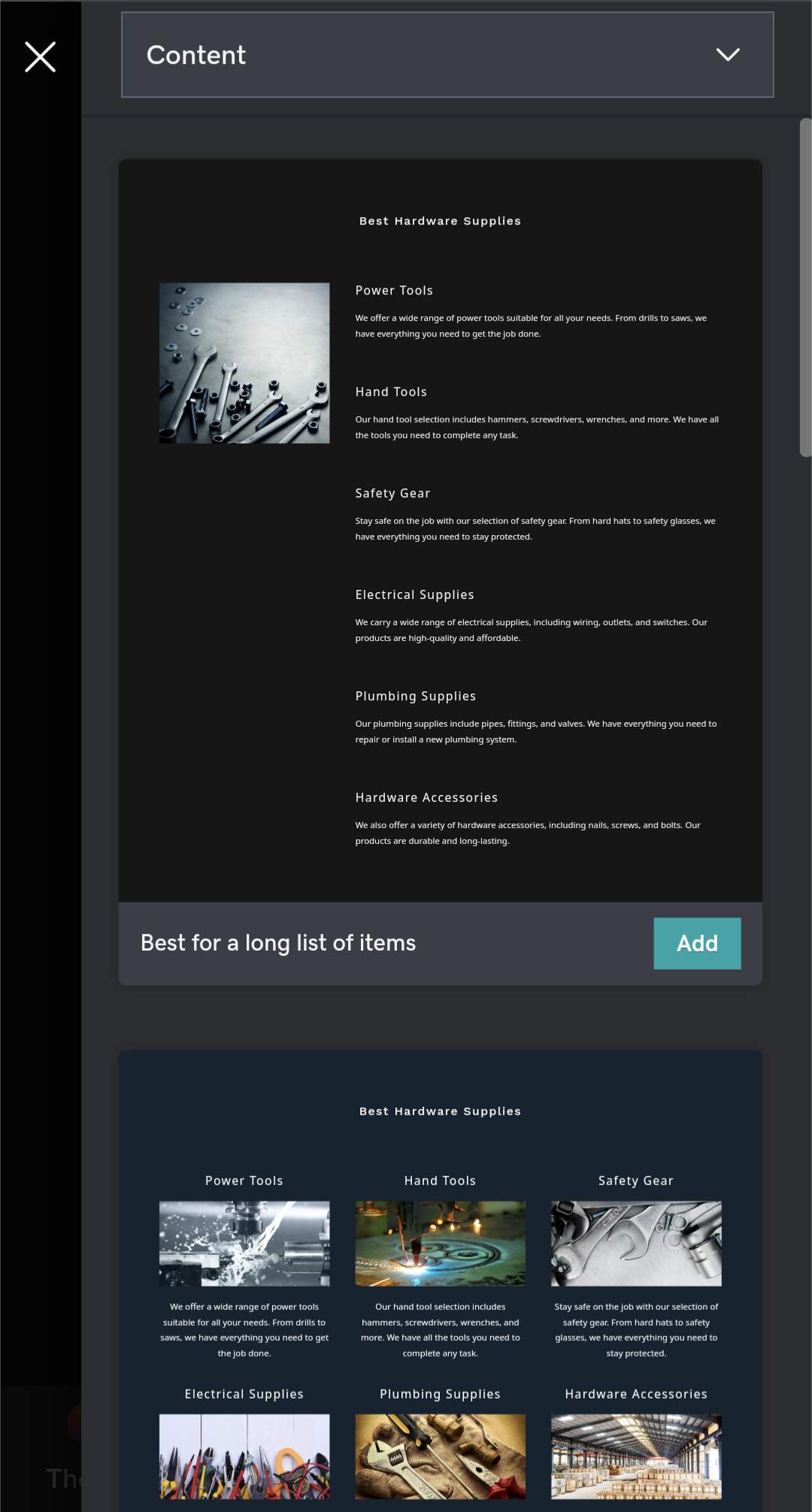
🏆
Winner: GoDaddy
. Neither GoDaddy nor HostGator offer a dedicated mobile app for editing websites. However, GoDaddy allows users to log into their account and access the website builder through a mobile web browser. While the experience might be slightly more constrained on a smaller screen, it still provides more flexibility than HostGator, which only allows for minor changes using a mobile browser. Therefore, GoDaddy has a slight edge over HostGator in terms of mobile editing capabilities.
Product testing options
Product Testing OptionsAssesses the options for trying out platform features before commitment.Score Components:
- Trial quality (40%): Extent and usefulness of the trial or free version.
- Feature accessibility (30%): How many features are available to test.
- Trial duration (20%): Length of the trial period.
- Ease of transition (10%): Smoothness of moving from trial to paid plans.
 8.1
8.1
 2.6
2.6
Overall Result
:
GoDaddy Wins
. GoDaddy scores 8.1 in product testing options, significantly higher than HostGator’s 2.6. GoDaddy offers a free version and a 30-day money-back guarantee for all paid plans, allowing users to explore all features. HostGator, on the other hand, does not offer a free or trial version, and its 30-day money-back guarantee comes with several exceptions.

|

|
|
|---|---|---|
|
Free Plan |
Yes |
No |
|
Trial Duration |
No (30-day money-back guarantee) | No |
|
Testing Premium Features |
Yes, within 30-day refund window |
Yes, within 30-day refund window (with exceptions) |
|
Money-Back Guarantee |
30 days for all paid plans |
30 days with exceptions |
Price
PriceLooks at the cost-effectiveness and value for money of each platform.Score Components:
- Plan value (40%): What each pricing tier offers.
- Transparency and clarity (30%): Clearness of pricing structures.
- Flexibility of plans (20%): Range of options to suit different budgets.
- Hidden costs (10%): Additional expenses not included in the plan.
 7.9
7.9
 6.2
6.2
GoDaddy and HostGator offer a range of pricing plans to cater to different user needs, with GoDaddy scoring slightly higher in terms of value for money.

|

|
|
|---|---|---|
|
Free |
Free ($0/month): Build a basic website with limited templates, storage, and features. Ideal for testing the platform. |
No offering at this amount. |
|
$0-$8 |
Basic ($5.99/month): More templates, custom domain support, email marketing, SEO tools, social media integrations, analytics. Ideal for personal websites and small businesses. Value for price: 6.5 |
No offering at this amount. |
|
$8-$14 |
Premium ($9.99/month): All Basic features + blog, ecommerce with product listings and payments, advanced marketing tools, and analytics. Ideal for businesses with online sales or growing web presence. Value for price: 8.0 |
Express Start ($12.95/month): Includes hosting, basic analytics dashboard, 3 email campaigns per month, up to 3 products. Value for price: 6.0 |
|
$14-$18 |
Commerce ($15.99/month): All Premium features + advanced ecommerce tools like cart recovery, discounts, reviews, memberships, and unlimited products. Ideal for businesses with significant online sales and complex product offerings. Value for price: 9.0 |
Express Site ($14.98/month): Offers hosting, advanced analytics dashboard, 5 email campaigns per month, up to 10 products. Value for price: 7.0 |
|
$18+ |
Pro ($19.99/month): All Commerce features + priority support, higher bandwidth, website security, and CDN. Ideal for businesses with high traffic and critical online presence. Value for price: 9.5 |
Express Store ($26.98/month): Comprehensive plan including hosting, advanced analytics dashboard, 10 email campaigns per month, unlimited products. Value for price: 8.5 |
location. As a result in rare cases the prices displayed here can differ from the ones you see on their
websites.
Hosting quality
Hosting
qualityExamines the reliability and performance of the hosting solutions.Score Components:
- Uptime (40%): Consistency and reliability of website availability.
- Speed (30%): Loading times and performance.
- Bandwidth and storage (20%): Sufficiency of resources provided.
- Data centers (10%): Quality and distribution of hosting infrastructure.
 7.8
7.8
 8.0
8.0
Winner: HostGator
. Both GoDaddy and HostGator offer a variety of hosting types with a 99.9% uptime guarantee. However, HostGator edges out with its automatic backup service and unlimited storage and bandwidth across all hosting types. GoDaddy’s hosting, while robust, may come with additional costs for restoration and inode limitations for high content users.

|

|
|
|---|---|---|
|
Do they offer hosting? |
Yes, included in all of their plans | Yes, included in all of their plans |
|
Data Centers: |
Data Centers in USA, France, Germany and UK Cloud Services Through AWS |
4 data centers: US(Texas, Utah), India(Mumbai), China(Hong Kong) |
|
Type of hosting: |
Shared Hosting, VPS Hosting, Dedicated, WordPress Hosting | Shared, Managed WordPress, VPS, Dedicated |
|
Uptime: |
99.9% | 99.9% |
|
Uptime Guarantee: |
Yes, 99.9% | Yes, 99.9% |
Website Speed Optimization
Website Speed OptimizationEvaluates optimization of website loading timesScore Components:
- PageSpeed Score (30%): Google’s score indicating performance optimization.
- Loading Time (30%): The average time until a website is fully interactive.
- Mobile Optimization (15%): Optimization effectiveness for mobile devices.
- Resource Optimization (15%): Optimizing images, scripts, and other heavy resources.
- CDN Usage (10%): Use of CDN to enhance speed across geolocations.
 7.6
7.6
 6.2
6.2
🏆 Winner: GoDaddy
Both GoDaddy and HostGator have strategies in place for website speed optimization, but GoDaddy’s comprehensive approach, including CDN, automatic maintenance, and resource optimization, gives it an edge over HostGator.

|

|
|
|---|---|---|
|
Focus |
CDN, Automatic Maintenance, Resource Optimization |
Browser Caching, CDN |
|
Performance Tools |
Google Lighthouse, PageSpeed Insights |
Google PageSpeed Insights |
|
Key Strategies |
CDN, Automatic Maintenance, Resource Optimization |
Browser Caching, CDN |
|
Load Times |
Shared Hosting: 2-4 seconds, VPS Hosting: 1-2 seconds, Dedicated Server: 0.5-1.5 seconds |
Varies widely, depending on the optimization, website complexity and the chosen hosting plan |
|
Page Speed Scores Range |
Shared Hosting: 50-70/100, VPS Hosting: 70-85/100, Dedicated Server: 80-95/100 |
Varies widely, depending on the optimization, website complexity and the chosen hosting plan |
|
Core Web Vitals Improvement |
Infrastructure upgrades, improved server infrastructure and data centers, effective caching mechanisms, image optimization tools, and automatic minification of code files |
Guidance on understanding and improving Core Web Vitals (CWV) for websites, emphasis on LCP, FID, CLS improvements |
GoDaddy has enhanced its platform through infrastructure upgrades, including improved server infrastructure and data centers, resulting in faster loading times. Additionally, the implementation of effective caching mechanisms, image optimization tools, and automatic minification of code files contribute to a smoother user experience and improved Core Web Vital metrics. The website builder features optimized templates and code structures for efficient rendering, further enhancing overall performance.
On the other hand, HostGator provides guidance on understanding and improving Core Web Vitals (CWV) for websites. The emphasis is on LCP, FID, CLS improvements. However, both load times and Page speed scores vary widely, depending on the optimization, website complexity, and the chosen hosting plan.
Get a head start on website creation with AI
Create a custom website tailored to your business needs 10X faster with 10Web AI Website Builder!
Plugins and integrations
Plugins and integrationsMeasures the range and effectiveness of additional plugins and integrations.Score Components:
- Variety of options (40%): Range of available add-ons.
- Integration smoothness (30%): Ease of integrating plugins into the site.
- Quality of plugins (20%): Functionality and reliability of the options.
- Custom integration capabilities (10%): Support for custom or third-party integrations.
 7.3
7.3
 7.3
7.3
🏆 Winner: Tie.
Both GoDaddy and HostGator score 7.3 in plugins and integrations. GoDaddy offers a more focused set of built-in features with the option to extend functionalities through limited plugins, while HostGator provides a wide range of plugins, known as apps, accessible via their app market. These apps cater to diverse needs such as advertising, website analytics, integrating social media, managing appointments, and conducting email marketing.
It’s worth noting that GoDaddy’s Managed WordPress Hosting and Unmanaged WordPress Hosting offer access to a vast WordPress plugin repository with over 59,000 plugins, covering diverse categories such as SEO, security, performance, ecommerce, forms, page builders, social media, backup, analytics, and more. On the other hand, HostGator’s apps enable you to enhance the capabilities of its website builder far beyond the basic features, including email marketing, integrating Google Ads and Bing Ads, social media connectivity, adding PayPal for payments, incorporating RSS feeds, syncing with Google Calendar, streaming with Twitch, and adding donation options like Ko-fi.
In terms of top integrations, GoDaddy provides versatile integrations, spanning marketing with Google Analytics and Mailchimp, ecommerce support via WooCommerce and Shopify, and business productivity tools like Salesforce and HubSpot. HostGator’s website builder offers a range of integrations, enabling users to enhance their site’s functionality and audience engagement, from advertising options like Google Ads and Bing Ads to interactive features such as Twitch streaming and podcast integration with platforms like Audioboom, Spreaker, and Soundcloud.
In conclusion, the choice between GoDaddy and HostGator for plugins and integrations would depend on your specific needs and preferences.
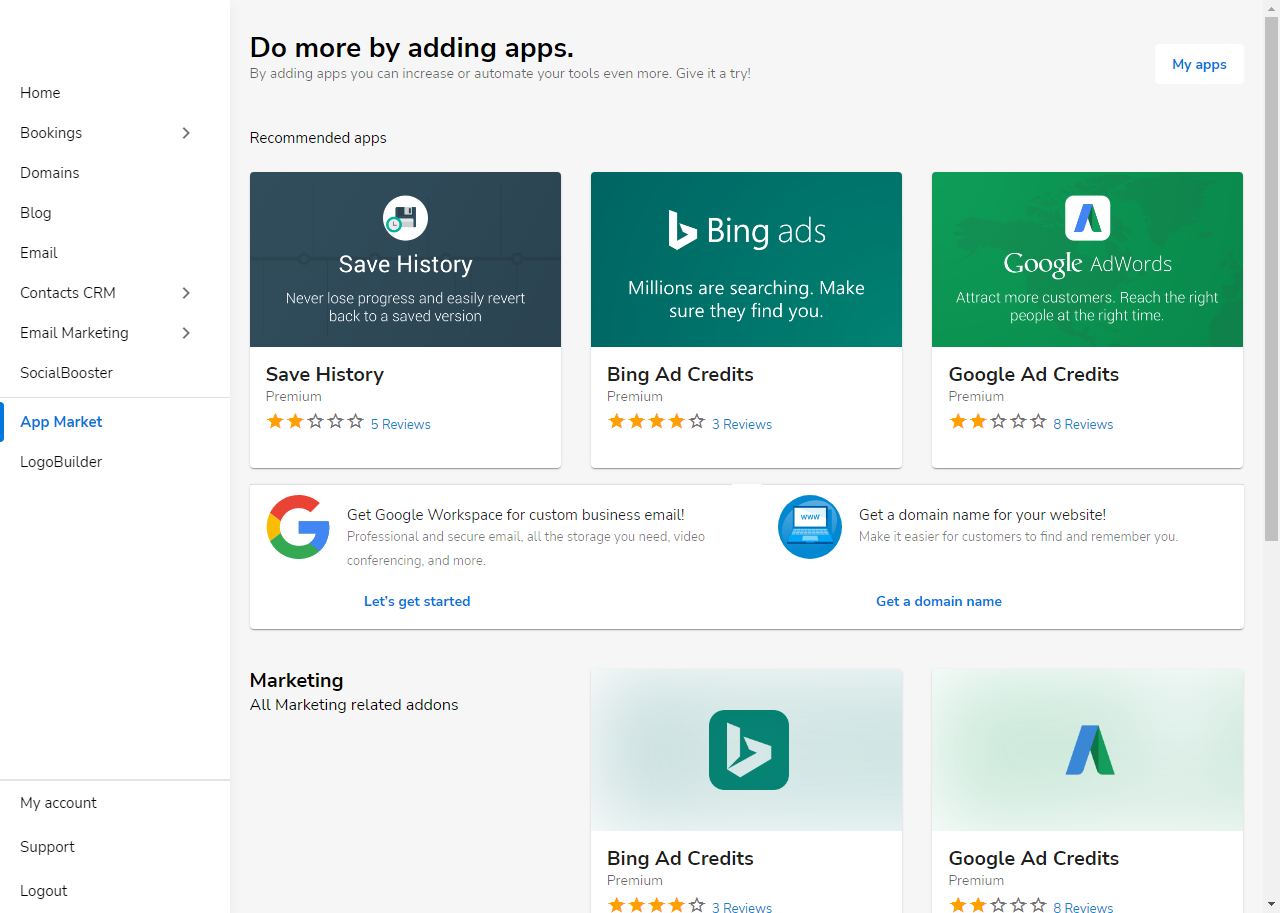
Marketing Features
Design FunctionalitiesRepresents how well each platform allows for creative design and customization of websites.Score Components:
- Template Variety (30%): Range and quality of design templates.
- Customization (30%): Flexibility and options for design alterations.
- User Interface (20%): Ease and intuitiveness of the design process.
- Responsiveness (10%): Adaptability to different devices and screen sizes.
- Innovation (10%): Unique design features and tools.
 7.3
7.3
 6.9
6.9
🏆
Overall Winner: GoDaddy
. GoDaddy edges out HostGator with a slightly higher score, offering a more comprehensive suite of marketing tools, especially in social media integration and ad campaign management. HostGator, however, offers competitive features, particularly in SEO and analytics.

|

|
|
|---|---|---|
|
SEO Tools |
|
|
|
Email Marketing |
|
(on higher plans) |
|
Blogging |
|
|
|
Social Media Integration |
Tools for social media linking and content sharing |
|
|
Analytics and Reporting |
Basic analytics with more detailed insights on higher plans |
Google Analytics integration on higher plans |
|
Ads and Promotions |
Features to create and track online ads, including Google Ads |
Google Ads and Bing Ads integration |
Customer Support
Customer supportEvaluates the quality and availability of support options.Score Components:
- Response time (40%): Speed of support responses.
- Support quality (30%): Effectiveness and helpfulness of the support.
- Availability (20%): Range of support channels (phone, chat, email).
- Resource richness (10%): Quality of self-help and educational materials.
 8.5
8.5
 7.3
7.3
🏆 Winner: GoDaddy
. In the GoDaddy vs HostGator comparison, GoDaddy takes the lead with its extensive customer support options. GoDaddy offers 24/7 phone support in multiple languages, live chat, and email assistance with a response time of within 24 hours. Additionally, users can access a 24/7 Community Forum and connect through social media channels, ensuring comprehensive support coverage.
HostGator also provides 24/7 support through email, phone, and live chat, catering to a global audience. However, it lacks the multilingual support and community forum that GoDaddy offers. While HostGator’s support is reliable, GoDaddy’s more versatile and accessible support options make it the better choice for users seeking robust customer support.
Security
SecurityLooks at the platforms’ security measures and data protection.Score Components:
- Data protection (40%): Safeguards for user and customer data.
- SSL and encryption (30%): Implementation of secure connections.
- Compliance (20%): Adherence to industry security standards.
- Regular updates (10%): Frequency of security updates and patches.
 6.8
6.8
 7.4
7.4
🏆
Winner: HostGator
. HostGator takes the lead in security with a score of 7.4 compared to GoDaddy’s 6.8. HostGator’s commitment to data protection is evident in its integration of security features such as SiteLock for malware scanning and its adherence to GDPR compliance. In terms of website security, HostGator provides extensive custom firewall rules and mod security rule sets, regular password audits, and SiteLock Security services for enhanced protection.
GoDaddy, while offering robust website security features like SSL certificates, malware scanning, and web application firewalls, provides limited options for private data storage protection. Users seeking comprehensive data security, especially for compliance with regulations like HIPAA or GDPR, may need to consider alternative solutions.
AI Capabilities
AI capabilitiesMeasures the effectiveness of AI-driven features and tools.Score Components:
- Automation efficiency (40%): Impact of AI on streamlining processes.
- Personalization (30%): AI-driven customization for users or customers.
- AI-Assisted design (20%): Role of AI in website design and functionality.
- Data analysis (10%): Use of AI in interpreting user data and analytics.
 7.5
7.5
 2.6
2.6

|

|
|
|---|---|---|
|
AI Builder |
|
Basic AI capabilities in the new website builder |
|
AI Ecommerce features |
AI-generated product descriptions, customer service tool, and digital ad creation |
|
|
AI Content Generation |
AI-generated product descriptions, customer service messages, and social media ads |
|
|
Additional AI features |
|
|
🏆 Winner: GoDaddy
. GoDaddy, with a score of 7.5, utilizes AI to enhance the ecommerce experience and content generation. Its AI features focus on generating product descriptions, customer service messages, and social media ads. This is in contrast to HostGator, which has a score of 2.6 and only offers basic AI capabilities in its new website builder.
User Management
User ManagementAssesses the platforms’ capabilities in managing user roles, permissions, and accessibility.Score Components:
- Role Customization (40%): Flexibility in creating and defining user roles and
permissions. - Ease of Management (30%): User interface and tools for managing users.
- Access Control (20%): Effectiveness of access control measures for different user
levels. - Scalability (10%): Ability to manage a growing number of users efficiently.
 7.3
7.3
 3.2
3.2
🏆 Winner: GoDaddy
. GoDaddy provides a more comprehensive user management system compared to HostGator.
- GoDaddy allows up to five users with full editing permissions for its Deluxe and Ultimate plans. In WordPress Hosting, there’s default support for unlimited users, each with customizable permission levels controlled through the WordPress dashboard.
- HostGator mentions the possibility to have multiple users for its hosting solutions, however, there’s no mention whether the mentioned users have the permission to edit the websites built with their website builder.
GoDaddy User Roles and Access Levels:
| Role | Description | Access Highlights |
|---|---|---|
| Account Holder | The primary owner of the GoDaddy Website Builder account. | Full access to all website builder features, domain management, hosting settings, and account settings. |
| Delegate Access | Users granted permission by the account holder to access specific parts of the GoDaddy account. | Can be given varying levels of access, from managing domains and products to making purchases on behalf of the account holder. |
| Website Editor | Users with permissions to edit and update the website through the Website Builder interface. | Can customize the website, add or edit sections (e.g., image galleries, menus), and update content. |
| Online Store Manager | Specifically for websites with e-commerce capabilities, managing product listings, orders, and payments. | Access to manage the online store, including product listings, coupons, shopping cart, shipping, and payments. |
Additional Features

|

|
|
|---|---|---|
|
SSL Certificate |
|
|
|
Custom Domain |
|
|
|
Free Custom Domain Included |
|
|
|
International Domains |
|
|
|
Mobile Responsive |
|
|
|
Page Speed |
|
|
|
Website Builder Mobile App |
|
|
|
Convert a Website To An App |
|
|
|
Website Analytics |
|
|
|
Multilingual Sites |
|
|
|
Multiple Users |
|
|
GoDaddy vs HostGator: User Feedback
Users generally praise GoDaddy for its affordability, reliability, and user-friendly interface, particularly in domain registration and hosting services. However, concerns include occasional interface changes, perceived slowness in website hosting, and dissatisfaction with pricing increases.
HostGator’s website builder receives mixed reviews from users, highlighting both its strengths and areas for improvement. Users appreciate the platform for its ease of use, making it accessible even for novices to build professional-looking websites, and for its range of web services that facilitate website creation and management, including domain registration and SSL certificates. However, concerns are raised regarding its customer support, which is often described as slow or unresponsive, potentially impacting users requiring timely assistance. Additionally, some users find the pricing structure to be high, particularly for small-scale developers or those needing only basic services.
The making of this blog
We followed a clear, step-by-step process to write and research this article.
GoDaddy vs HostGator: FAQ
Which platform is better for beginners, GoDaddy or HostGator?
Can I use both GoDaddy and HostGator for ecommerce?
How do GoDaddy and HostGator compare in terms of website speed and hosting quality?
What are the major differences in pricing and value between GoDaddy and HostGator?
Which platform offers better customer support, GoDaddy or HostGator?









